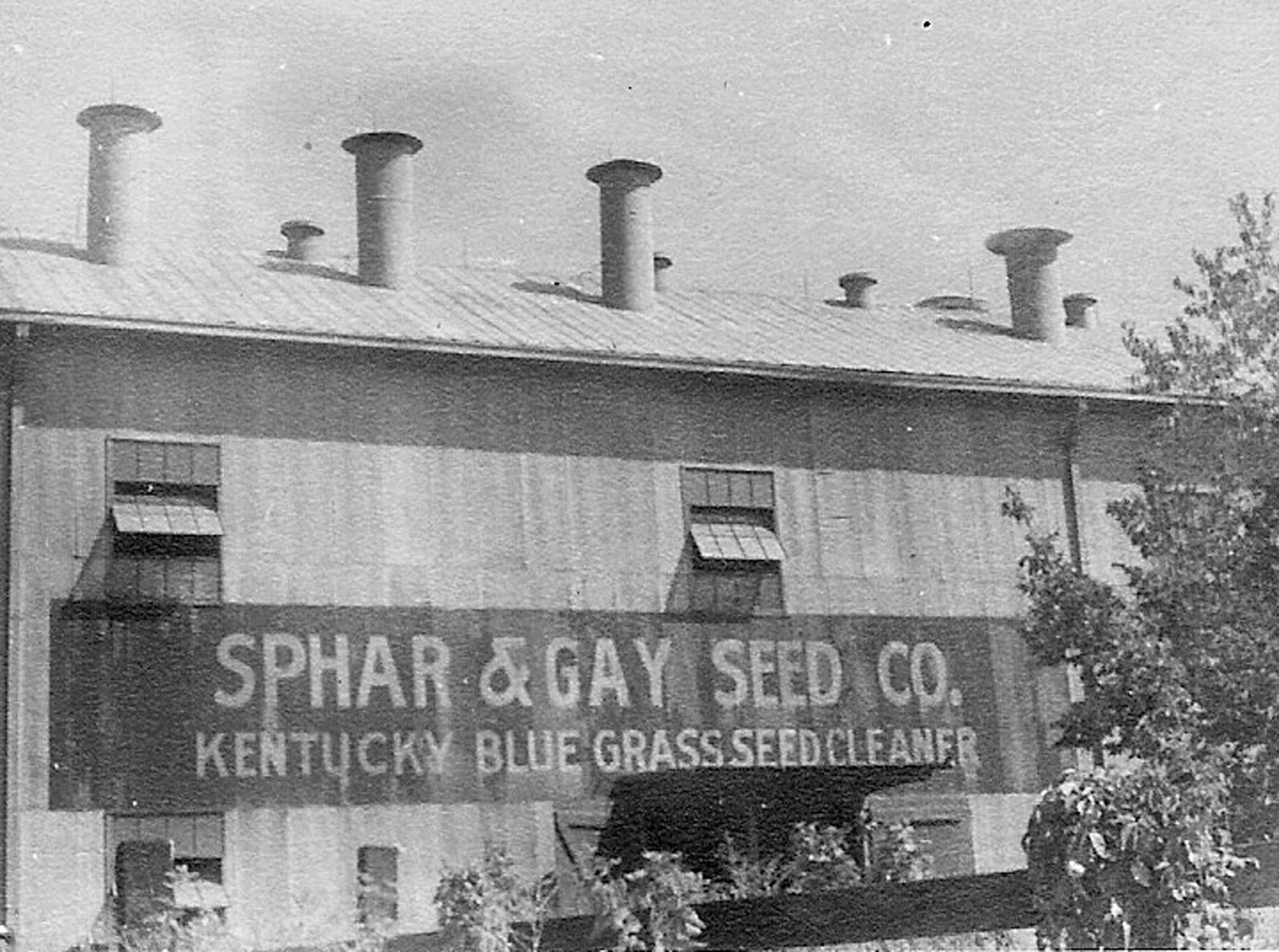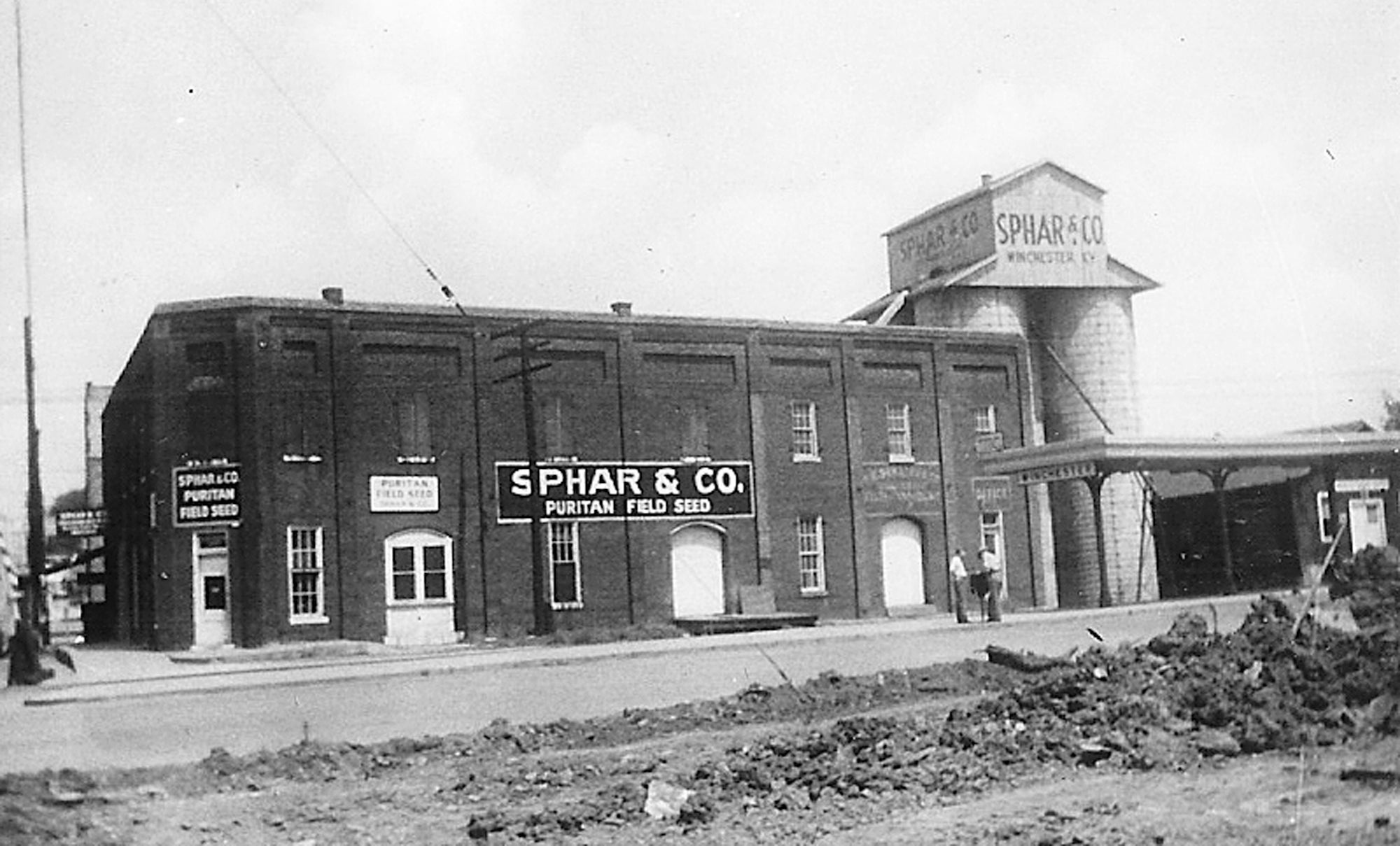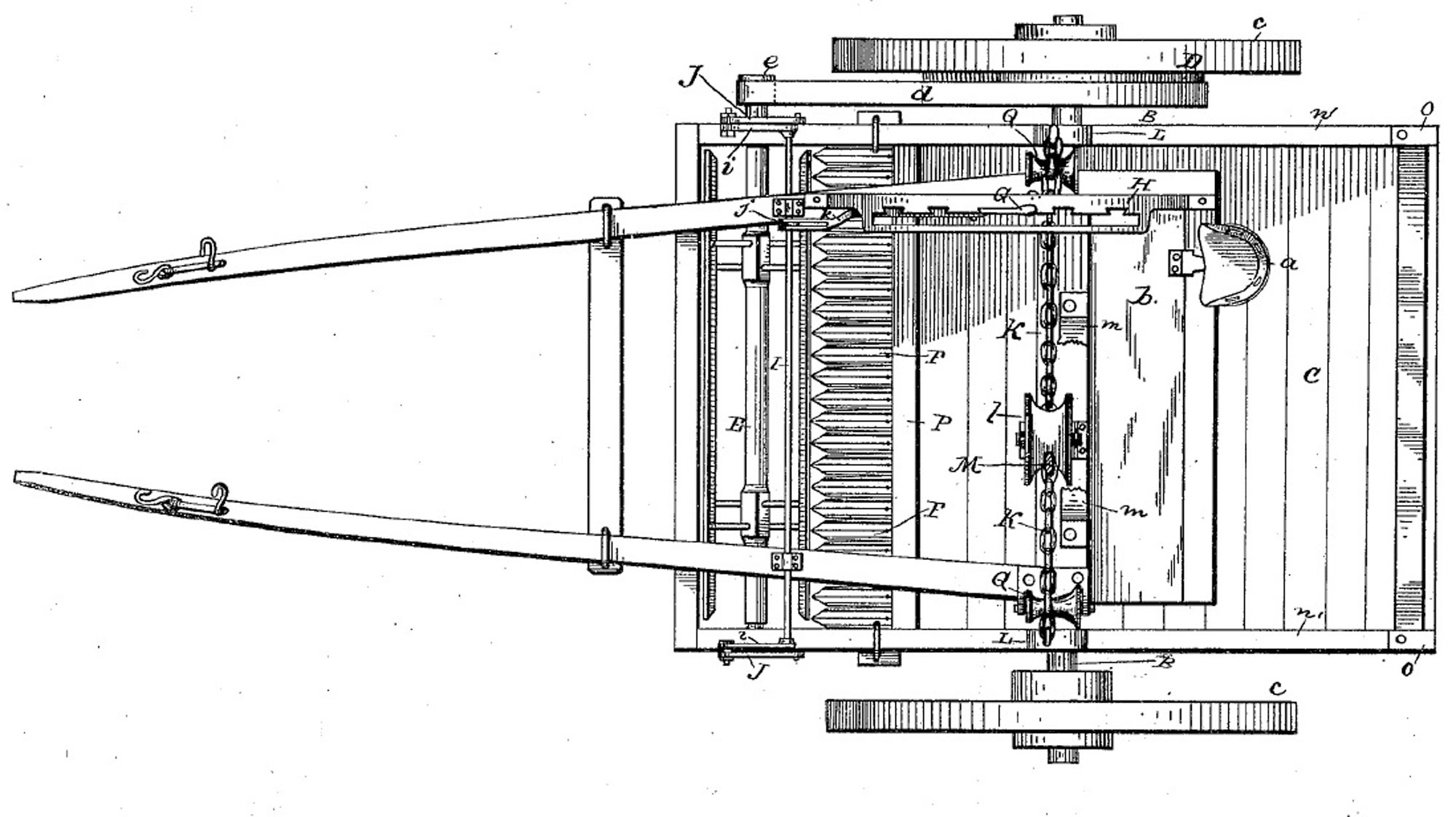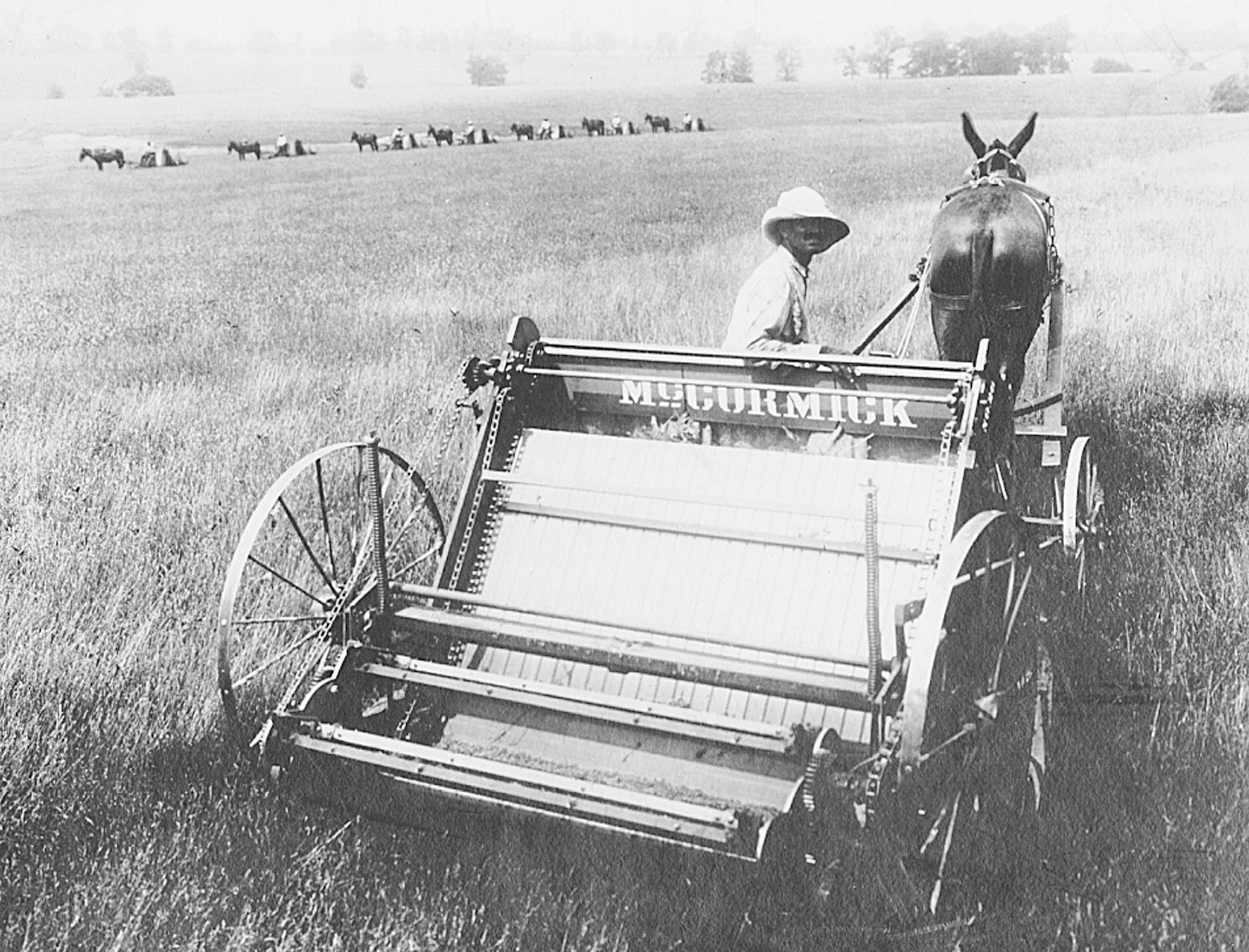More history of the V.W. Bush Warehouse
Published 8:17 am Saturday, January 13, 2018
This is the fourth and last installment in a series of articles on the history of the V.W. Bush Warehouse, better known locally as the “Sphar Building.”
Bluegrass seed era
in Clark County
Several lines of evidence show the growing importance of grass seed production in Clark County in the late 19th century.
Jacob I. C. Naff of Winchester received two U.S. patents related to grass seed implements — one in 1884 for “an improved grass seed harvester” that was pulled by mules, and one in 1885 for an adjustable comb that could be used to harvest seed from “different kinds of grasses such as bluegrass, timothy, orchard, &c.”
Naff’s patents were followed by several from the McCormick brothers. Harry T. and William H. McCormick were awarded a patent in 1903 for “an improved grass seed stripper,” and Samuel E. McCormick was issued a patent in 1913 for “a bluegrass seed stripper.”
The brothers manufactured and repaired strippers at their shop on Lexington Road. The business was described in an article in the Winchester Sun (1922):
“On or near the site of Strode’s Station is now located McCormick’s machine shop in which for the past several years has been manufactured a successful make of a machine-operated bluegrass seed stripper. It is the invention of the three McCormick brothers of Clark County, each being a natural mechanic as well as inventors. The machine, a four-wheeled vehicle, is horse drawn, with driver and attendant, is driven across or around the fields, the revolving long-toothed steel combs strip the seed from the grass stems; the seeds being placed in bags by a mechanical conveyor. The grass is left standing, only the seeds are taken.”
Agricultural statistics indicate substantial production of specialty grass seeds in the U.S. began around the turn of the century. Due to its ease of culture and nutrient value, farmers across the country began planting bluegrass to pasture livestock, and the demand for Kentucky bluegrass seed took off.
Total grass seed production in Kentucky in 1870 was 35,806 bushels, which included timothy, clover, rye and others. By 1900, the state was producing an estimated 500,000 bushels of bluegrass seed alone. Production would peak in 1912 at 1,500,000 bushels.
Clark County was at the center of this industry. Kentucky led the nation in bluegrass seed production, which provided an important boost to Clark County’s agricultural economy during the first half of the 20th Century.
The railway warehouses played a significant role in the industry by providing a ready marketplace for seed. They also made seed more marketable by processing and cleaning the raw product supplied by growers. Bluegrass seed cleaning equipment is still in place in the local warehouse.
It was the seed industry that helped the Bush Warehouse adapt and survive as a viable commercial establishment while other warehouses went out of business and disappeared.
As a result, the Bush Warehouse today is the only building associated with Winchester’s early rail history still standing.
Bluegrass seed statistics at the county level are only available from 1949 through 1964. In 1949, Clark County led the state, with 72 farms growing one-third of the bluegrass seed produced in Kentucky. That portion fell to one-fifth of the total by 1959, when 23 farms in the county were still harvesting seed.
Clark County also led the state in 1964, but the data indicates bluegrass seed production had, for all practical purposes, come to an end — only five farms were still growing and harvesting seed. By 1969, bluegrass seed production had essentially relocated to the Pacific Northwest and Canada.
Riding the strippers provided summer employment for many high school boys in the 1950s and early 1960s, including the author. There are still dozens of these machines rusting away on Clark County farms today.
Business enterprises
at the Bush Warehouse
V.W. Bush’s warehouse was originally in the business of buying and selling hemp, wheat and tobacco. After Bush died in 1899, the warehouse became heavily involved in the bluegrass seed business.
The proprietor was V.W. Bush’s wife, Kate. At her death in 1927, she left the warehouse to her son, V.W. Bush Jr., a Winchester attorney. He died in 1963 and willed the warehouse to his daughters, Clara and Wilma.
Neither Kate, V.W. Jr., nor his daughters had a major role in warehouse management. That job appears to have been left to Levi Goff for many years.
Levi had day-to-day care of the “Goff & Bush” enterprise, which operated until 1936. Various sources list Levi’s occupation as grain warehouse employer, warehouse clerk, grain dealer and seed buyer.
In 1936, a new company stepped in to operate the warehouse. That July W. R. Sphar and his son W. R. “Bill” Sphar Jr. formed a partnership — Sphar & Co. — to handle “feed, seed, fertilizer, grain and wool” in a rented section of the warehouse.
W.R. Sphar Sr., an active farmer, left operation of the company to Bill Sphar and Gus White, who had previously worked for Goff & Bush.
Sphar & Co. retailed feed, fertilizer and Puritan Field Seed to area farmers. The company soon took over the entire warehouse and enlarged their wholesale business in bluegrass seed.
In 1939, the Sphars formed a new partnership — Sphar & Gay Seed Company — which greatly expanded their bluegrass seed operation. The partners, W.R. Sphar Sr., Bill Sphar, H.W. Sphar and J.D. Gay Jr., operated warehouses and processing facilities near the C&O Railroad at Pine Grove in Clark County.
Articles of agreement stated their main business was “cleaning, processing, preparing for market, handling, storing, buying, selling, shipping and delivering blue grass seed.”
Following the decline of bluegrass seed production in Kentucky, the Sphar and Gay partnership was dissolved (1972). Sphar & Co. then filed new principals — Bill and Asa Sphar, Asa Reeves, Clark Barnett and Jack Buchanan. The company continued their retail operation at the Bush Warehouse until 1999, when they sold the business to Spencer Pittman and Wayne Wilson. The latter operated a feed store called Sphar Feed & Seed until 2005.
Although it would be re-invented several times, the warehouse survived as a commercial establishment for 125 years.
The building’s utilitarian design proved adaptable to each new operation it housed. The V.W. Bush Warehouse — the last surviving 19th-Century warehouse in the city — is set to be repurposed yet again.
Plans call for the building to serve as Winchester’s welcome center and to house several local agencies.
Harry Enoch, retired biochemist and history enthusiast, has been writing for the Sun since 2005.









